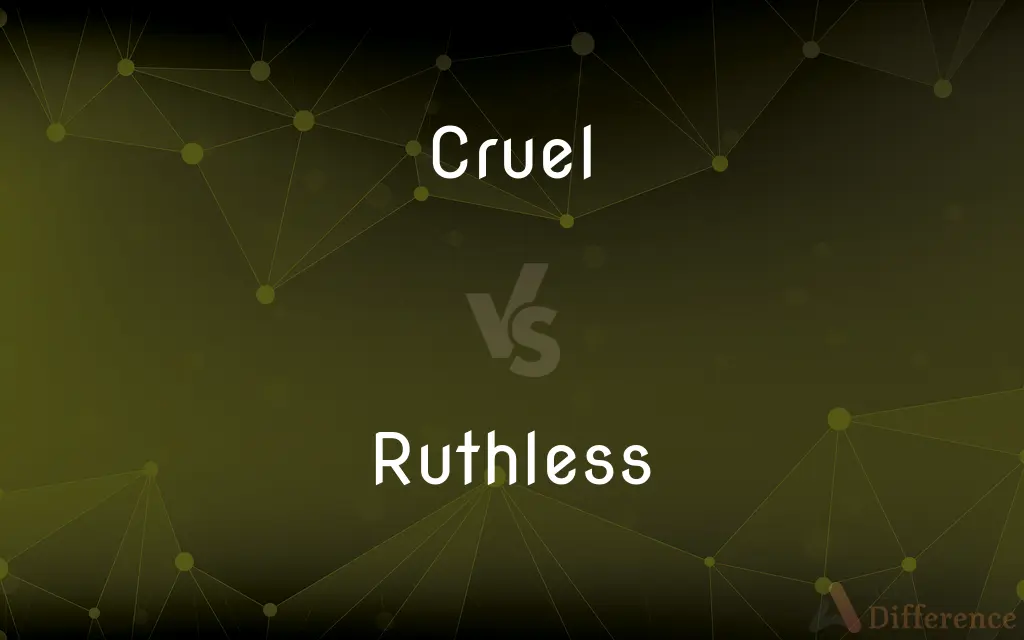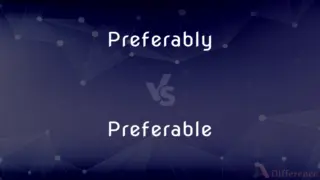Cruel vs. Ruthless — What's the Difference?
By Fiza Rafique & Urooj Arif — Updated on March 16, 2024
Cruelty involves deliberate infliction of pain or suffering, whereas ruthlessness is about achieving goals with no regard for the harm caused.

Difference Between Cruel and Ruthless
Table of Contents
ADVERTISEMENT
Key Differences
Cruel actions are characterized by the deliberate intention to inflict pain or suffering on others. This can involve both physical and emotional harm. On the other hand, ruthlessness is defined by a single-minded pursuit of goals, disregarding any harm or suffering that might be inflicted on others in the process.
Cruel behavior often stems from a desire to dominate, punish, or exert power over someone, indicating a personal or emotional investment in causing pain. In contrast, ruthlessness is usually driven by pragmatic goals, where the infliction of pain is incidental, not the primary objective.
Individuals who are cruel enjoy seeing their victims suffer, suggesting a psychological gratification derived from the act. Whereas, ruthless individuals might not derive any pleasure from the suffering their actions cause; their focus is on achieving their aims efficiently, regardless of the collateral damage.
Cruelty can be found in personal relationships or small-scale interactions, where the perpetrator has a direct connection to the victim. Ruthlessness, however, is often observed in larger, impersonal contexts, such as business or politics, where the consequences of actions are detached from personal relationships.
In terms of societal perception, cruel acts are often condemned on moral and ethical grounds, as they reflect a direct intent to harm. Ruthlessness might be criticized for its cold and impersonal nature, but in some contexts, it can be seen as a necessary trait for leadership or decision-making.
ADVERTISEMENT
Comparison Chart
Intent
To inflict pain
To achieve goals
Emotional Tie
Often personal
Impersonal
Pleasure
Derived from others' pain
Not pleasure-driven
Context
Personal/small-scale
Impersonal/large-scale
Societal View
Morally condemned
Sometimes admired
Compare with Definitions
Cruel
Showing a deliberate desire to cause pain or suffering.
The dictator's cruel policies caused widespread misery.
Ruthless
Showing no mercy or compassion in pursuit of objectives.
The CEO's ruthless tactics drove the competition out of business.
Cruel
Indicative of a lack of human compassion or empathy.
Her cruel remarks about his artwork crushed his spirit.
Ruthless
Determined and relentless, stopping at nothing to succeed.
His ruthless ambition led him to betray even his closest allies.
Cruel
Enforcing strict punishment or harsh measures.
The cruel teacher was feared by all her students.
Ruthless
Lacking tenderness or warmth; cold and hard.
The spy had a ruthless efficiency that made her feared.
Cruel
Harsh and unrelenting in nature.
The cruel winter left many animals struggling to survive.
Ruthless
Immune to feelings of guilt or remorse over actions taken.
The conqueror was ruthless in his conquest, sparing no one.
Cruel
Exhibiting pleasure in causing pain or suffering.
The movie's villain was particularly cruel, delighting in his victims' despair.
Ruthless
Pragmatic and utilitarian, focused solely on results.
Her ruthless decision-making saved the company during the crisis.
Cruel
Disposed to inflict pain or suffering
A cruel tyrant.
Ruthless
Having no compassion or pity; merciless
Ruthless cruelty.
Ruthless opportunism.
Cruel
Causing or characterized by severe pain, suffering, or distress
Cruel treatment.
A cruel remark.
Ruthless
Without pity or compassion; cruel, pitiless.
Cruel
Intentionally causing or reveling in pain and suffering; merciless, heartless.
The supervisor was very cruel to Josh, as he would always give Josh the hardest, most degrading work he could find.
Ruthless
Having no ruth; cruel; pitiless.
Their rage the hostile bands restrain,All but the ruthless monarch of the main.
Cruel
Harsh; severe.
Ruthless
Without mercy or pity;
An act of ruthless ferocity
A monster of remorseless cruelty
Cruel
(slang) Cool; awesome; neat.
Cruel
(nonstandard) To a great degree; terribly.
Cruel
To spoil or ruin (one's chance of success)
Cruel
To violently provoke (a child) in the belief that this will make them more assertive.
Cruel
See Crewel.
Cruel
Disposed to give pain to others; willing or pleased to hurt, torment, or afflict; destitute of sympathetic kindness and pity; savage; inhuman; hard-hearted; merciless.
Behold a people cometh from the north country; . . . they are cruel and have no mercy.
Cruel
Causing, or fitted to cause, pain, grief, or misery.
Cruel wars, wasting the earth.
Cursed be their anger, for it was fierce; and their wrath for it was cruel.
Cruel
Attended with cruetly; painful; harsh.
You have seen cruel proof of this man's strength.
Cruel
Lacking or showing kindness or compassion or mercy
Cruel
(of persons or their actions) able or disposed to inflict pain or suffering;
A barbarous crime
Brutal beatings
Cruel tortures
Stalin's roughshod treatment of the kulaks
A savage slap
Vicious kicks
Cruel
(of weapons or instruments) causing suffering and pain;
Brutal instruments of torture
Cruel weapons of war
Cruel
Used of circumstances (especially weather) that cause suffering;
Brutal weather
Northern winters can be cruel
A cruel world
A harsh climate
A rigorous climate
Unkind winters
Common Curiosities
Can someone be both cruel and ruthless?
Yes, a person can exhibit both traits, intentionally causing pain while pursuing their goals without regard for others.
What defines a cruel person?
A cruel person intentionally seeks to cause pain or suffering to others, often deriving pleasure from their distress.
Is ruthlessness a desirable trait in business?
While ruthlessness can be effective in achieving business objectives, it often comes at the cost of ethical considerations and human relationships.
Are there any justifiable reasons for cruelty?
Most societies consider cruelty to be morally and ethically wrong, with few scenarios where causing intentional pain or suffering is justifiable.
What psychological traits are associated with ruthlessness?
Traits such as high ambition, pragmatism, and a focus on results are often associated with ruthlessness.
Can acts of ruthlessness be justified in times of war?
Acts of ruthlessness in war can sometimes be justified under the principles of military necessity, but are still subject to ethical scrutiny.
How do ruthless leaders affect their followers?
Ruthless leaders can achieve significant results but may foster a culture of fear and lack of trust among their followers.
What is the difference between being firm and being ruthless?
Being firm involves setting and maintaining clear boundaries with respect, while being ruthless involves pursuing goals without regard for others' well-being.
How do societies deal with cruel behavior?
Societies use legal and social mechanisms to deter and punish cruel behavior, promoting ethical and compassionate interactions.
Can cruelty be unintentional?
Cruelty typically involves intentionality; unintentional harm is not usually classified as cruelty.
Do ruthless people feel empathy?
Ruthless individuals might possess empathy but choose to suppress it in pursuit of their goals.
Is cruelty a learned behavior?
Cruelty can be influenced by a combination of environmental factors, upbringing, and personal choices.
Can animals be cruel or ruthless?
Animals can exhibit behaviors that seem cruel or ruthless, but these are generally driven by instinct rather than malice or ambition.
How does media portrayal affect our perception of cruelty and ruthlessness?
Media can influence perceptions by glorifying ruthlessness as a trait of successful individuals or by highlighting the negative impacts of cruelty.
Is there a way to rehabilitate a cruel person?
Rehabilitation can be possible through psychological interventions, education, and fostering empathy, though success varies depending on individual circumstances.
Share Your Discovery

Previous Comparison
Preferably vs. Preferable
Next Comparison
Door vs. EmbrasureAuthor Spotlight
Written by
Fiza RafiqueFiza Rafique is a skilled content writer at AskDifference.com, where she meticulously refines and enhances written pieces. Drawing from her vast editorial expertise, Fiza ensures clarity, accuracy, and precision in every article. Passionate about language, she continually seeks to elevate the quality of content for readers worldwide.
Co-written by
Urooj ArifUrooj is a skilled content writer at Ask Difference, known for her exceptional ability to simplify complex topics into engaging and informative content. With a passion for research and a flair for clear, concise writing, she consistently delivers articles that resonate with our diverse audience.














































